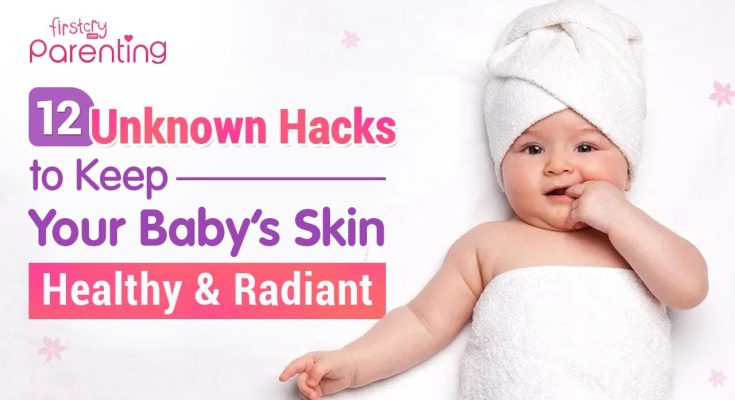A baby’s skin is delicate, soft, and more sensitive than an adult’s. Newborns have thinner skin, which makes them more prone to dryness, rashes, and irritation. That’s why proper skincare is essential to keep your baby’s skin smooth, healthy, and protected. By following some simple skincare tips, you can help prevent common skin problems and ensure your baby’s comfort.
In this guide, we’ll explore easy and effective tips for keeping your baby’s skin healthy and irritation-free.
1. Bathe Your Baby the Right Way
Newborns don’t need a bath every day. In fact, bathing too often can strip their skin of natural oils, leading to dryness and irritation.
How Often Should You Bathe Your Baby?
- Newborns (0-6 weeks): 2-3 times a week is enough. On other days, clean their face, hands, neck, and diaper area with a damp cloth.
- Older babies (6+ weeks): Bathing every other day or as needed works well.
Bathing Tips for Healthy Skin:
- Use lukewarm water (not too hot) to prevent skin dryness.
- Choose mild, fragrance-free baby soap to avoid irritation.
- Keep bath time short (5-10 minutes) to prevent skin from drying out.
- Pat your baby’s skin dry instead of rubbing.
2. Keep Your Baby’s Skin Moisturized
A baby’s skin loses moisture quickly, so keeping it hydrated is essential.
How to Moisturize Your Baby’s Skin:
- Apply a fragrance-free, hypoallergenic baby lotion right after a bath.
- Use natural oils like coconut oil or olive oil if your baby has dry patches.
- Avoid petroleum-based products if your baby has sensitive skin.
For newborns, their skin naturally peels in the first few weeks. This is normal, and applying lotions or oils isn’t necessary unless the skin looks dry.
3. Prevent and Treat Diaper Rash
Diaper rash is a common issue caused by prolonged exposure to moisture, friction, or irritants in diapers.
How to Prevent Diaper Rash:
- Change diapers frequently to keep your baby’s skin dry.
- Allow air time by letting your baby go diaper-free for a few minutes each day.
- Use a gentle, fragrance-free diaper cream with zinc oxide as a protective barrier.
- Choose super-absorbent, breathable diapers to reduce moisture buildup.
If diaper rash occurs, clean the area gently and apply a thick layer of diaper cream. If the rash doesn’t improve within a few days, consult a pediatrician.
4. Choose Baby-Friendly Clothing and Laundry Detergents
The fabrics and detergents you use can affect your baby’s skin.
Baby Clothing Tips:
- Dress your baby in soft, breathable fabrics like cotton.
- Avoid rough, synthetic materials that can cause irritation.
- Wash new clothes before use to remove potential allergens or chemicals.
Laundry Tips for Sensitive Skin:
- Use a mild, fragrance-free baby detergent to prevent irritation.
- Avoid fabric softeners as they often contain harsh chemicals.
- Double rinse clothes to remove any detergent residue.
5. Protect Your Baby’s Skin from the Sun
A baby’s skin is more sensitive to the sun and can burn easily. Babies under six months should be kept out of direct sunlight as much as possible.
Sun Protection Tips:
- Dress your baby in lightweight, long-sleeved clothing and a wide-brimmed hat.
- Use a stroller shade or umbrella to provide shade outdoors.
- If your baby is older than six months, apply a baby-safe, mineral-based sunscreen with SPF 30+ on exposed skin.
Never use regular sunscreen on babies younger than six months. Instead, keep them in the shade as much as possible.
6. Handle Common Baby Skin Issues with Care
Cradle Cap
- A flaky, scaly condition on a baby’s scalp.
- Gently massage the scalp with baby oil and wash with a mild shampoo.
- Use a soft brush to remove flakes.
Baby Acne
- Small red or white bumps on the baby’s face.
- Avoid using lotions or creams.
- Wash the face with lukewarm water and let it clear up naturally.
Eczema (Dry, Itchy Skin Patches)
- Use a hypoallergenic moisturizer multiple times a day.
- Keep baths short and avoid harsh soaps.
- Dress your baby in loose, cotton clothing.
If eczema worsens, consult a pediatrician for specialized creams or treatments.
7. Be Mindful of Over-the-Counter Products
Not all baby skincare products are safe. Some contain harsh chemicals, fragrances, or alcohol that can cause irritation.
What to Look for in Baby Skincare Products:
- Hypoallergenic and fragrance-free formulations.
- Paraben-free and sulfate-free ingredients.
- Pediatrician-recommended brands.
Always do a patch test before trying a new lotion, soap, or cream on your baby’s skin.
Final Thoughts
Caring for your baby’s delicate skin doesn’t have to be complicated. By following these simple skincare tips—bathing properly, moisturizing, preventing diaper rash, choosing gentle fabrics, protecting from the sun, and handling common skin issues with care—you can keep your baby’s skin soft, healthy, and irritation-free.
Every baby’s skin is unique, so pay attention to how their skin reacts to different products and make adjustments as needed. When in doubt, consult your pediatrician for the best skincare advice.
With gentle care and attention, your baby’s skin will stay soft, smooth, and healthy for years to come!



